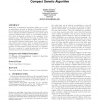Free Online Productivity Tools
i2Speak
i2Symbol
i2OCR
iTex2Img
iWeb2Print
iWeb2Shot
i2Type
iPdf2Split
iPdf2Merge
i2Bopomofo
i2Arabic
i2Style
i2Image
i2PDF
iLatex2Rtf
Sci2ools
105
click to vote
GECCO
2005
Springer
2005
Springer
Not all linear functions are equally difficult for the compact genetic algorithm
Estimation of distribution algorithms (EDAs) try to solve an optimization problem by finding a probability distribution focussed around its optima. For this purpose they conduct a sampling-evaluation-adjustment cycle, where search points are sampled with respect to a probability distribution, which is adjusted according to the evaluation of the sampled points. Although there are many successful experiments suggesting the usefulness of EDAs, there are only few rigorous theoretical results apart from convergence results without time bounds. Here we present first rigorous runtime analyses of a simple EDA, the compact genetic algorithm, for linear pseudo-boolean functions on n variables. We prove a number of results showing that not all linear functions have the same asymptotical runtime. Categories and Subject Descriptors F.2 [Theory of Computation]: Analysis of Algorithms and Problem Complexity General Terms Theory, Algorithms, Performance Keywords Theoretical Analysis, Runtime, Compa...
| Added | 27 Jun 2010 |
| Updated | 27 Jun 2010 |
| Type | Conference |
| Year | 2005 |
| Where | GECCO |
| Authors | Stefan Droste |
Comments (0)

